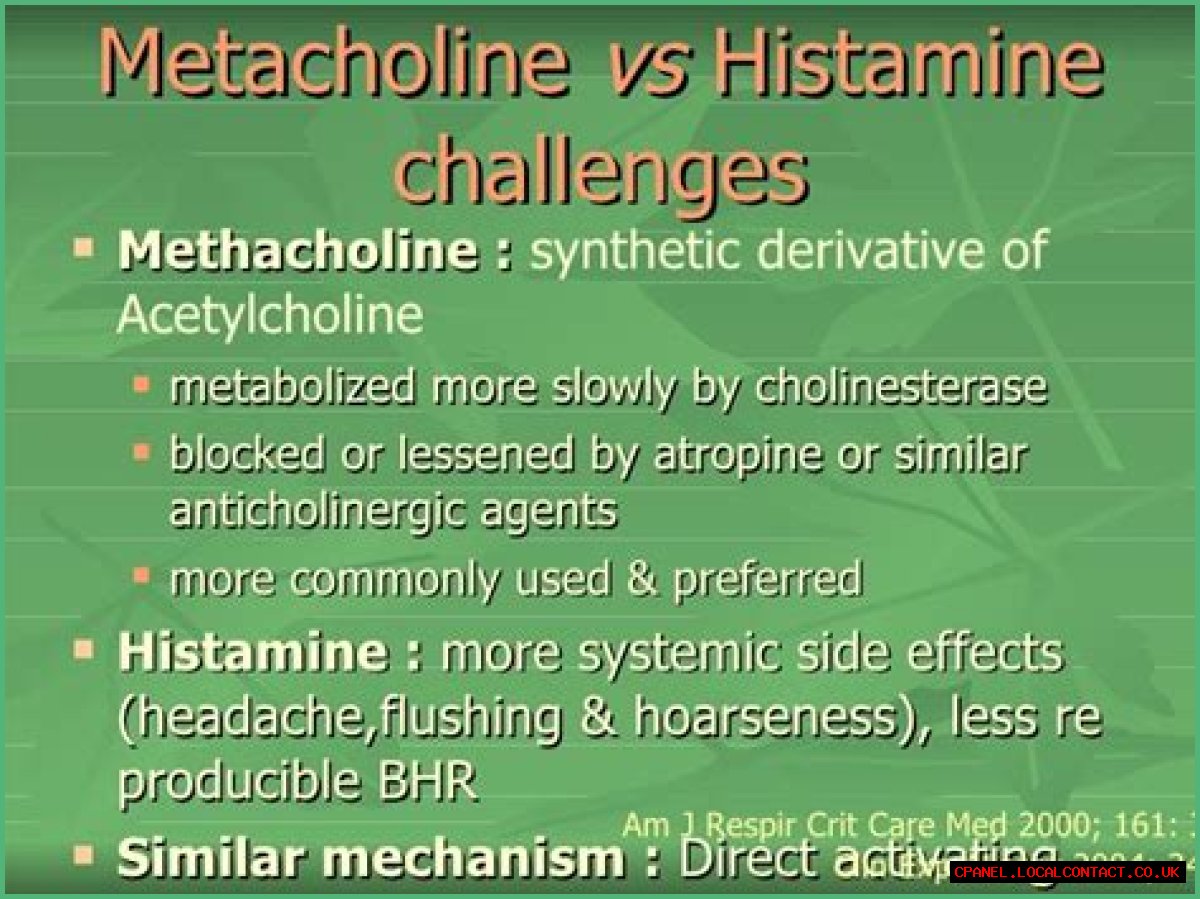What are the side effects of methacholine?
Headache, sore throat, lightheadedness, nausea, vomiting, or dizziness may occur. If any of these effects persist or worsen, tell your doctor or pharmacist promptly. Remember that this medication has been prescribed because your doctor has judged that the benefit to you is greater than the risk of side effects.
What happens after methacholine challenge test?
How will I feel after my methacholine challenge test? You should be breathing normally after your methacholine challenge test. Your pulmonary function technologist will give you a bronchodilator to reverse the effects of methacholine before you go home.
What does methacholine do to the body?
Methacholine inhalation is used to help your doctor diagnose bronchial airway hyperreactivity or asthma. This medicine works by narrowing your bronchial airways. The degree of narrowing will be measured by a device called a spirometer.
👉 For more insights, check out this resource.
Does everyone react to methacholine?
Methacholine will provoke bronchoconstriction, symptoms of cough and wheezing, and a fall in baseline FEV1 in a similar manner. Everyone eventually will respond to methacholine in this manner, but much less methacholine is needed in people with asthma to reduce FEV1.
👉 Discover more in this in-depth guide.
Is a methacholine challenge test safe?
Although the test is very safe, it can cause bronchoconstriction, or tightening of the airways. Rarely, you may experience symptoms of an asthma attack, such as chest tightness, coughing, wheezing or shortness of breath.
How do you fail a methacholine test?
Don’t eat anything 2 hours before your test. You can have a light meal, such as a sandwich, soup, or salad, at least 2 hours before your test. Don’t have any drinks with caffeine, such as coffee, tea, cola, or chocolate at least 4 hours before your test. Don’t do any strenuous activity or exercise the day of your test.
How do you fail a methacholine challenge test?
Can you have asthma with a negative methacholine challenge?
A sizeable percentage of subjects who report physician diagnosed asthma have a negative methacholine challenge test. These subjects are characterized by diagnosis of asthma as an adult and by normal or near normal spirometry.
Can methacholine challenge wrong?
In patients with mild asthma, the dosimeter technique for methacholine challenge test may produce false-negative results. The effects of corticosteroids on airway hyper-responsiveness may persist for long periods following withdrawal of corticosteroids.
Can you pass a methacholine test and still have asthma?
For example, methacholine challenge is acknowledged as a highly sensitive test for asthma, but it can be negative in subjects who are not having active symptoms, in subjects who have normal lung function, or in elite athletes with exercise-induced asthma [10-12].
What are the side effects of methacholine challenge tests?
Thousands of methacholine challenge tests have been performed by laboratories with no serious side effects (3, 27-29, 37-40). Transient symptoms including wheezing, cough, mild dyspnea, and chest tightness are common in patients with BHR, although many experience no symptoms.
Is metacholine challenge testing useful in the evaluation of occupational asthma?
Methacholine challenge testing is also a valuable tool in the evaluation of occupational asthma. Methacholine challenge testing is sometimes used to determine the relative risk of developing asthma, assess the severity of asthma, and assess response to asthma therapy although its clinical use in these areas has not been well established. Rationale.
Is it safe to inhale methacholine during MCTS?
It is strongly recommended that deep inhalations during MCTs be avoided to preserve the high diagnostic sensitivity. The bronchoprotective effect of inhaling methacholine by using total lung capacity inspirations has a marked influence on the interpretation of the test result.
What is the breathing test for methacholine?
A breathing test will be repeated after each dose of methacholine to measure the degree of narrowing or constriction of the airways.
